Deconstructing the McCain plan
McCain strategy threatens ‘graduated diplomatic, military, and economic costs’ on Pakistan

The 80-year-old was diagnosed with brain cancer less than two weeks ago, after doctors discovered a brain tumour when the lawmaker underwent surgery to remove a blood clot from above his left eye.PHOTO: Reuters
For Islamabad this constant expectation from Washington that it ought to do more against the Taliban and other militant outfits has started to resemble a wonky CD player that plays the same song over and over again. Pakistan has done more than in its part in stubbing out the flames of insurgency in Afghanistan. Yet Washington, like Kabul, has chosen to scapegoat Pakistan; it would be fairer if it accepted its own shortcomings and that of the Afghan National Army.
Woven into McCain’s strategy is a recounting of possible benefits that could accrue from a long-term US-Pakistan strategic partnership. Recognising Pakistan as one of the most important actors in Afghanistan, a role that the US Defence Department has publicly acknowledged this summer, McCain seeks a constructive role from the country as Washington pursues a peaceful resolution of the Afghan conflict. Given the tricky, fragile and complex regional relationships, the US senator hopes to work through flexible frameworks to advance the goal of regional cooperation on border security, intelligence sharing and trade. But a lot more is required to reduce mistrust and build confidence among regional players. Similar efforts have failed in the past.
Published in The Express Tribune, August 15th, 2017.
Like Opinion & Editorial on Facebook, follow @ETOpEd on Twitter to receive all updates on all our daily pieces.















COMMENTS
Comments are moderated and generally will be posted if they are on-topic and not abusive.
For more information, please see our Comments FAQ